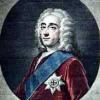Lord Chesterfield

Lord Chesterfield
Philip Dormer Stanhope, 4th Earl of Chesterfield KG PCwas a British statesman, and a man of letters, and wit. He was born in London to Philip Stanhope, 3rd Earl of Chesterfield, and Lady Elizabeth Savile, and known as Lord Stanhope until the death of his father, in 1726. Educated at Trinity Hall, Cambridge, he subsequently embarked on the Grand Tour of the Continent, to complete his education as a nobleman, by exposure to the cultural legacies of Classical antiquity and...
men clothes coats
Next to clothes being fine, they should be well made, and worn easily; for a man is only the less genteel for a fine coat, if, in wearing it, he shows a regard for it, and is not as easy in it as if it was a plain one.
life dream mean
When I reflect upon what I have seen, what I have heard, what I have done, I can hardly persuade myself that all that frivolous hurry and bustle and pleasure of the world had any reality; and I look on what has passed as one of those wild dreams which opium occasions, and I by no means wish to repeat the nauseous dose for the sake of the fugitive illusion.
men pleasing-others addresses
A man's fortune is frequently decided by his first address. If pleasing, others at once conclude he has merit; but if ungraceful, they decide against him.
distance world degrees
A certain degree of ceremony is a necessary outwork of manners, as well as of religion; it keeps the forward and petulant at a proper distance, and is a very small restraint to the sensible and to the well-bred part of the world.
distance silly men
All ceremonies are in themselves very silly things; but yet, a man of the world should know them. They are the outworks of Mannersand Decency, which would be too often broken in upon, if it were not for that defence, which keeps the enemy at a proper distance.
dark able sanctuary
In business be as able as you can, but do not be cunning; cunning is the dark sanctuary of incapacity.
feelings temptation age
I am in the pitiable situation of feeling all the force of temptation without having the strength to succumb to it.
pain rocks people
Pleasure is the rock which most young people split upon; they launch out with crowded sails in quest of it, but without a compassto direct their course, or reason sufficient to steer the vessel; for want of which, pain and shame, instead of pleasure, are the returns of their voyage.
sincerity
Sincerity is the most compendious wisdom.
heart done half
Half the business is done, when one has gained the heart and the affections of those with whom one is to transact it.
giving-up party unity
I could wish there were a treaty made between the French and the English theatres, in which both parties should make considerableconcessions. The English ought to give up their notorious violations of the unities, and all their massacres, racks, dead bodies, and mangled carcasses, which they so frequently exhibit upon their stage. The French should engage to have more action, and less declamation, and not to cram and to crowd things together to almost a degree of impossibility from a too scrupulous adherence to the unities.
learning heart ignorance
A learned parson, rusting in his cell at Oxford or Cambridge, will reason admirably well on the nature of man; will profoundly analyse the head, the heart, the reason, the will, the passions, the sentiments, and all those subdivisions of we know not what; and yet, unfortunately, he knows nothing of man.... He views man as he does colours in Sir Isaac Newton's prism, where only the capital ones are seen; but an experienced dyer knows all their various shades and gradations, together with the result of their several mixtures.
perfect ease treating-others
True politeness is perfect ease and freedom. It simply consists in treating others just as you love to be treated yourself.
self firsts natural
Nothing is more dissimilar than natural and acquired politeness. The first consists in a willing abnegation of self; the second in a compelled recollection of others.